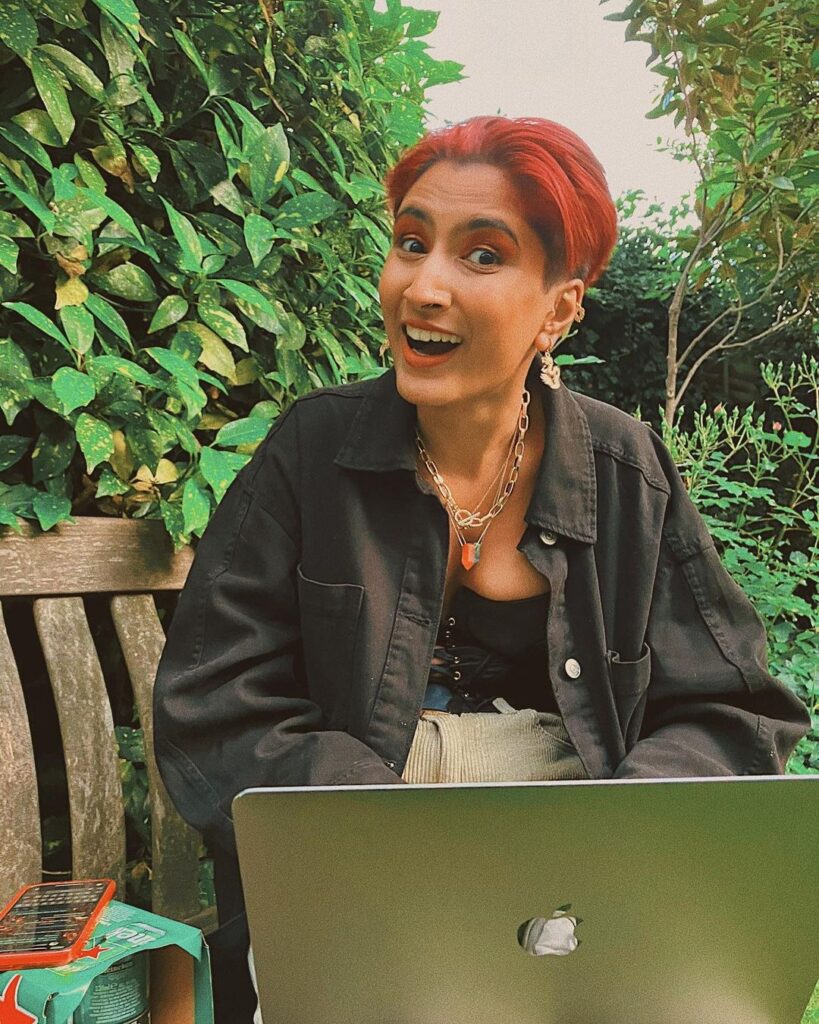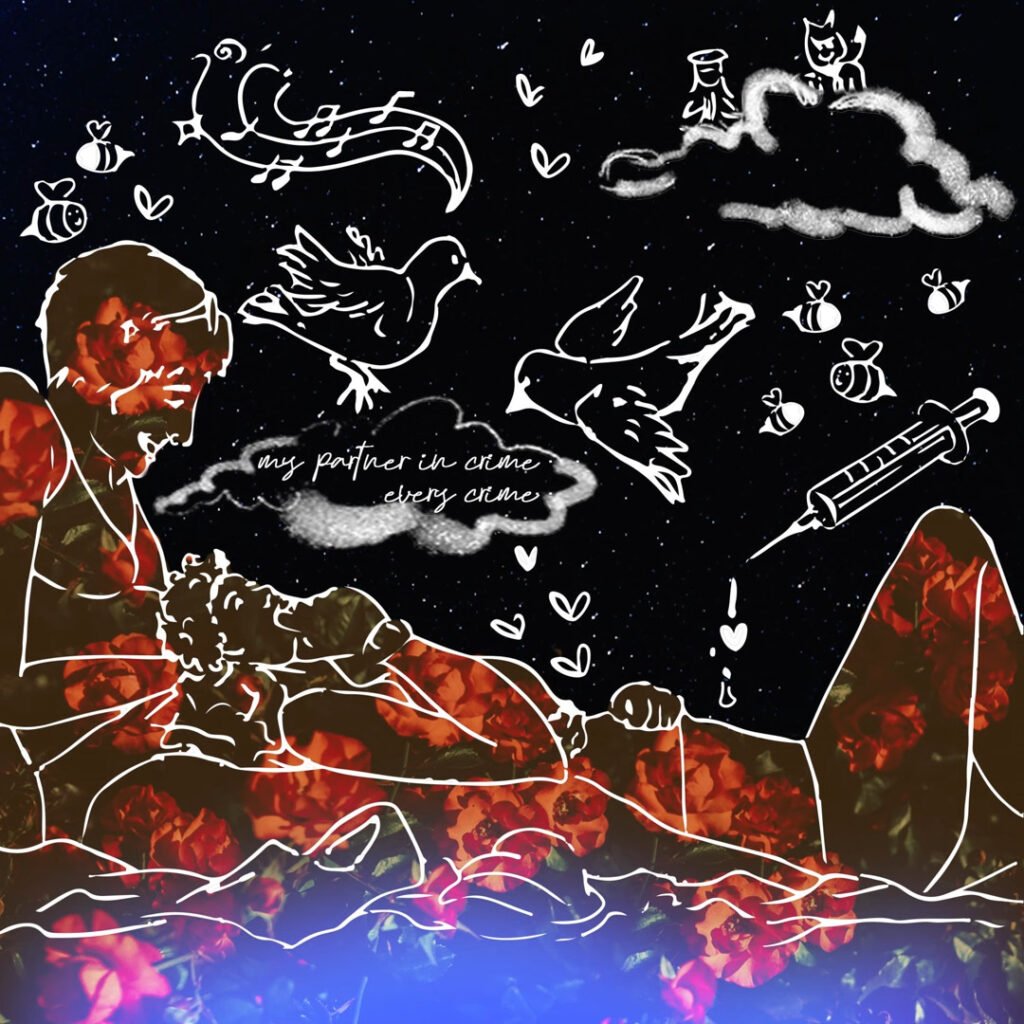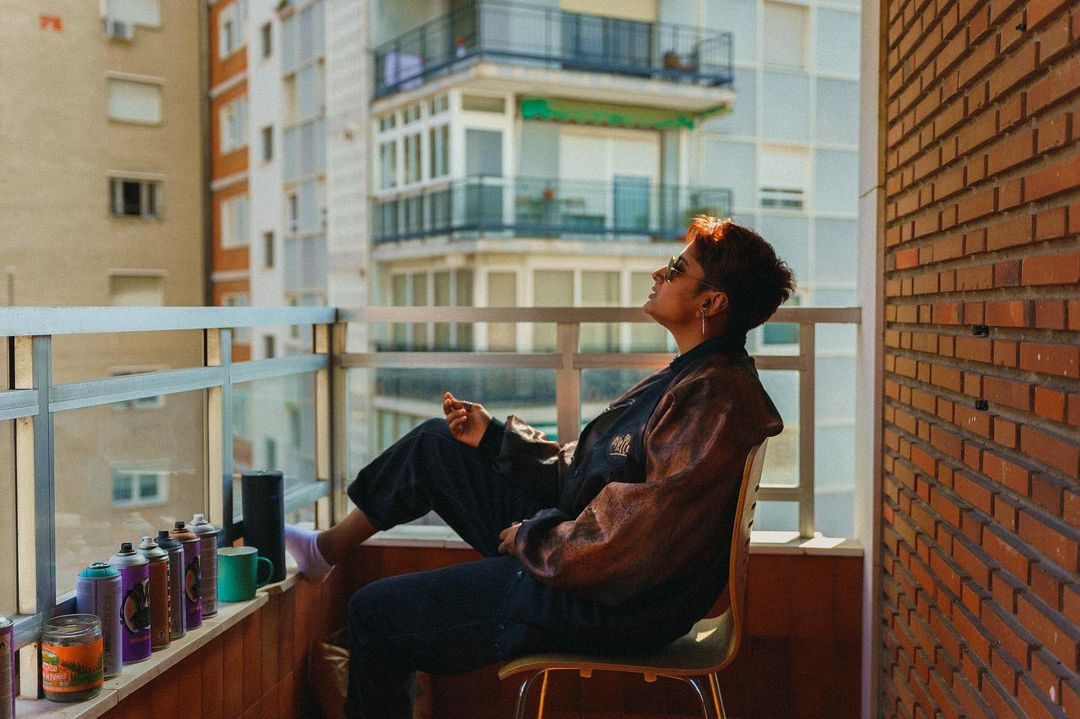The queer and non-binary musician ku:hu tells her own story of heartbreak and finding a sense of identity “in an otherwise confusing world” by fusing elements of lo-fi with R&B and neosoul to create a distinctive soundscape. Born in Vadodara, India, spent her early years in Riyadh, Saudi Arabia, and immigrated to London, United Kingdom at the age of 7, their love for music was influenced by the sounds they were exposed to as children, including pop and rock music and Hindustani classical music. The Australian pianist Elaine Fenn’s classical piano lessons helped this love of music grow even more. She specialized in performing pieces from 20th-century western classical music, particularly serialist works by Arnold Shoenberg and jazz compositions by George Gershwin.
ku:hu earned a degree in music from Royal Holloway, University of London between 2017 and 2020, and she finished her master’s degree in contemporary performance with production at Berklee College of Music between 2020 and 21.
In addition to her music work, ku:hu is an enthusiastic photographer and a former radio show host. She hosts her own program called “Coffee Break Sessions with Sans,” where she and Sans discuss current events and introduce listeners to new and exciting music.
Along with her friend and fellow musician wroi, ku:hu will soon release the song “by your side,” which tells the tale of finding the good in a toxic relationship. This is a component of the larger project “The Long Weekend,” which explores the relationship between the acoustic and the electronic by telling the tale of heartbreak and how it can either mend or destroy a relationship. Check out the latest track & the exclusive interview below:

1. Can you tell us a bit about where you come from and how you got started?
KU:HU: Hi! I’m ku:hu, I’m a queer & non-binary musician based in London. I was born in Vadodara, India and then moved to a township around 500km from Riyadh (the capital city of Saudi Arabia) called Ras Tanura when I was 4. From there, I moved to London at the age of 7 and have been based and living there since (with a brief period where I lived in Valencia, Spain to do my masters). I started in music quite young, basically when I moved to the UK. My parents enrolled me in piano lessons and from there, my love of music grew to what it is now, where I can create my own stuff.
2. Did you have any formal training or are you self-taught?
KU:HU: I’ve been taking piano lessons since the age of 7, as well as singing lessons since the age of 11. I also have a bachelor’s degree in Music from Royal Holloway, University of London as well as a master’s degree in Contemporary Performance (Production Concentration) at Berklee College of Music. So basically, a LOT of formal training.
3. Who were your first and strongest musical influences and why the name ‘KU:HU’?
KU:HU: My influences stem from pretty much anywhere, I have a broad music taste; I think this comes from moving around so much growing up and encountering so many different genres of music.
But I would say, musically, my biggest influences stem from 80s & 90s R&B music; artists like Sadé, TLC, Toni Braxton & Aaliyah really shaped my childhood.
In terms of why ‘ku:hu’: well simply put, it’s a childhood/family nickname. In Indian families at least, we use an entirely different name to your real name as a nickname or a ‘pet name’ as its affectionately called. Mine was Kuhu, and it comes from the sound cuckoo birds make when they sing. My dad gave me the nickname. I added the embellishment of a colon to make it stand out just a bit more.
4. What do you feel are the key elements in your music that should resonate with listeners, and how would you personally describe your sound?
KU:HU: I would say my sound is nostalgic, atmospheric, and ethereal. My music is a vessel for me to tell my own story of heartbreak and finding myself. I try to not include a lot of pronouns like most songs do because I want the words to stick more than make people wonder who the song is about or what possibly could have happened for me to sit down and write a song. I’m inspired by everything around me, whether that is something someone said, or the weather and you’ll hear those kinds of immersive snippets in my music. One important element to my music is the immersive aspect, the ability to transport you to somewhere that’s not your physical world.

KU:HU:
Excellent question! Well, my entire musical journey has been a phase of learning and then emulating and this could not ring truer in my childhood with piano and voice lessons. I was mainly learning classical pieces and emulating those. But this always felt limiting, and I felt like I could do so much more. It wasn’t until I joined Berklee for my masters that I realized that there was so much more out there and that I enjoyed making music and thus began the transition into making more lo-fi and R&B music.
6. What’s your view on the role and function of music as political, cultural, spiritual, and/or social vehicles – and do you try and affront any of these themes in your work, or are you purely interested in music as an expression of technical artistry, personal narrative and entertainment?
KU:HU: I think music is a bit of both: political, cultural, spiritual, and/or social vehicles and an expression of personal narrative. It solely depends on the artist and their own processes with music. Personally, I use music as an expression of personal narrative but the whole process of making music for me is a spiritual, healing experience – I sometimes see it as a form of artistic therapy, letting out my feelings through creative means.
7. Do you feel that your music is giving you back just as much fulfilment as the amount of work you are putting into it, or are you expecting something more, or different in the future?
KU:HU: I’ve had quite a love/hate relationship with music. At one point, I entirely gave up on the idea of making music or even playing music because it became all about the perfection of it all and not the enjoyment. I always felt like I was meant to do something bigger, something better essentially and found myself chasing after that and feeling so unhappy in the process. However, since I started making my own music and speaking to other musicians, my stance on the matter has changed. I give myself a lot less pressure than I used to. Now, as it’s my first single, I feel like my music is giving back as much fulfilment as the work I put in and it can only get better from here really.
8. Could you describe your creative processes? How do usually start, and go about shaping ideas into a completed song? Do you usually start with a tune, a beat, or a narrative in your head? And do you collaborate with others in this process?
KU:HU: Usually with songs, I like to map things out – what key it will be in, reference tracks of what I’m inspired by and what story I want to tell. I also collaborate with others in the process in terms of asking them what their thoughts are and if there’s anything I could add more. I think it’s the pianist in me, but I always start with the chord sequence. I’ll sit by the piano and just start playing random chords until a sequence sticks.
9. What has been the most difficult thing you’ve had to endure in your life or music career so far?
KU:HU: I’d say I’ve had a few difficult encounters in my musical career – one of them was when I had tendonitis in my right wrist at age 18. It ruined my confidence in playing and really affected me practicing. It’s at a much better stage now where playing doesn’t destroy my wrist, but back then, it was the biggest thing for me. The other was when I failed my second-year performance module during my bachelor’s degree. I had the worst performance anxiety, and my fingers froze up during the recital. I didn’t really think I could perform again and spent an entire year after that focusing on the ‘what ifs’ of it all. It wasn’t until my ex-piano teacher (now mentor) suggested I apply for Berklee to get my mojo back. I didn’t know it then, but it really was a saving grace.
10. On the contrary, what would you consider a successful, proud or significant point in your life or music career so far?
KU:HU: I think releasing this song and fleshing out the idea for the entire EP is definitely up there! But I think the biggest success so far is performing for the first time in like 2-3 years during my masters. It was in front of a large Zoom crowd of people from around the world (just your standard COVID life), but the support was overwhelmingly positive and I really enjoyed myself!
KEEP IN TOUCH:
FACEBOOK | INSTAGRAM | TWITTER | SPOTIFY | YOUTUBE

Photo credits: Sansy Rewatkar

